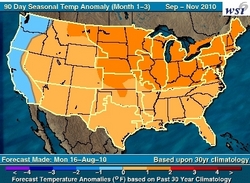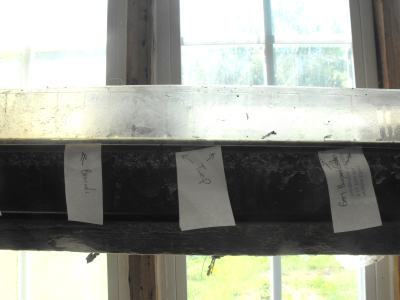
Gambling on a warm fall
 "Did
you know that we're forecast to have a warmer than average fall this
year?" I called to Mark as he set out to work on the shed's roof.
Mark came in and looked over my shoulder at this
prediction by Weather Services International that forecasts
abnormally warm temperatures through November everywhere in the U.S.
except on the Pacific coast.
"Did
you know that we're forecast to have a warmer than average fall this
year?" I called to Mark as he set out to work on the shed's roof.
Mark came in and looked over my shoulder at this
prediction by Weather Services International that forecasts
abnormally warm temperatures through November everywhere in the U.S.
except on the Pacific coast.
"What would you do
differently if you knew the growing season was going to extend for an
extra month?" Mark probed. Well, that was easy --- I would start
a lot more of the fall
crops that didn't
come up in the dog days' heat, tricking them into germinating indoors
in flats then transplanting them to the garden.
 Our
traditional first frost date is October 10 --- 46 days away --- and I
need about 55 to 70 growing days to make it worthwhile to replant all
of the roots and cabbages that failed me in the garden. Even that
is an optimistic estimate, since you should usually add two weeks to
the "days to harvest" on your seed packet when planning fall crops to
take into account shorter days as the year fades. I figured there
was no way fall crops would have time to mature if I planted them this
late, so I assumed we'd just make do without them.
Our
traditional first frost date is October 10 --- 46 days away --- and I
need about 55 to 70 growing days to make it worthwhile to replant all
of the roots and cabbages that failed me in the garden. Even that
is an optimistic estimate, since you should usually add two weeks to
the "days to harvest" on your seed packet when planning fall crops to
take into account shorter days as the year fades. I figured there
was no way fall crops would have time to mature if I planted them this
late, so I assumed we'd just make do without them.
But what if the killing
frost really did hold off for an extra few weeks? Isn't it worth
wasting a dollar's worth of seed on a gamble if you could instead win a
bushel of carrots, beets, cabbage, broccoli, and turnips? I
wonder what it says about me that I would never buy a lottery ticket
but have no problem gambling on the garden?
Want more in-depth information? Browse through our books.
Or explore more posts by date or by subject.
About us: Anna Hess and Mark Hamilton spent over a decade living self-sufficiently in the mountains of Virginia before moving north to start over from scratch in the foothills of Ohio. They've experimented with permaculture, no-till gardening, trailersteading, home-based microbusinesses and much more, writing about their adventures in both blogs and books.
Want to be notified when new comments are posted on this page? Click on the RSS button after you add a comment to subscribe to the comment feed, or simply check the box beside "email replies to me" while writing your comment.

I first thought from this headline that you were talking about playing poker this autumn. :^)
Well, with a lottery ticket, you know for sure the odds are not in your favor. You can at least claim in the case of the garden that it's a good gamble. If the lottery offered you a chance to pay $1 to roll a die, and get $10 back if you rolled a six, you might be willing to play that game a few times too...